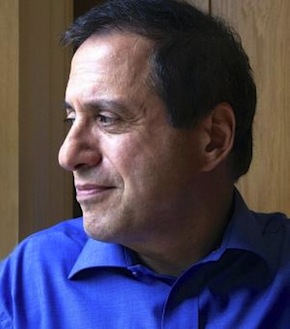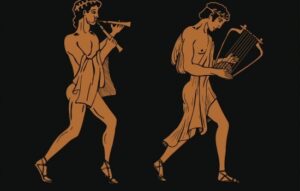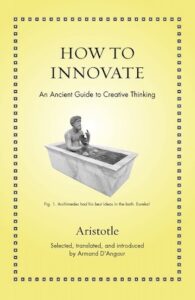Armand D’Angour: A classically philosophical life?
by Mika Provata-Carlone There are books that leave you silent – with awe, or shock, or both. And then there are some others that make you yearn for the space in between silence and voice: for a space for more of the author’s thoughts, a space for questions, for engaged and engaging exchanges. Armand d’Angour’s books belong to this latter type. They unfailingly nudge their readers into active involvement and participation, they require, almost, an encounter. How to Innovate: An Ancient Guide to Creative Thinking comes at a time when the concept of thinking as a way of life seems to be particularly critical, especially when viewed from the perspective of the Classical tradition and our relation to it. Armand D’Angour has very generously responded to a few direct questions about his work, methods and future plans. His fulsome responses will hopefully engender more questions, inspire more thoughts, lead to more books, and especially encounters between the old and new, the young and the old.
There are books that leave you silent – with awe, or shock, or both. And then there are some others that make you yearn for the space in between silence and voice: for a space for more of the author’s thoughts, a space for questions, for engaged and engaging exchanges. Armand d’Angour’s books belong to this latter type. They unfailingly nudge their readers into active involvement and participation, they require, almost, an encounter. How to Innovate: An Ancient Guide to Creative Thinking comes at a time when the concept of thinking as a way of life seems to be particularly critical, especially when viewed from the perspective of the Classical tradition and our relation to it. Armand D’Angour has very generously responded to a few direct questions about his work, methods and future plans. His fulsome responses will hopefully engender more questions, inspire more thoughts, lead to more books, and especially encounters between the old and new, the young and the old.
Mika: The Greeks (and the Romans): Dead White Males or fellow wayfarers on the journey of humanity? What are your thoughts on the current polemics regarding the place, value and future of the Classics, in both a more specific and a broader, cultural sense?
Armand: Some of the more extreme views being expressed about the Classics are both misguided and upsetting. To study the Greeks and Romans, their great history, philosophy, art and wonderful literature, is obviously not to endorse or approve of such things as slavery, misogyny and colonialism, which have been features of virtually every culture in past millennia. Similarly, the use of Classics by some in the past to promote and maintain class structures (though Classics has also encouraged strong countercultural and anti-elitist drives) does not detract from the value and pleasure that anyone who wishes might get from studying the texts, art etc. The Classics remain at the root of so many of the cultural achievements of the modern world – logic, medicine, philosophy, drama, music, poetry and so on – that there will always be a future for them, and indications are that many nations and governments are now embracing the study of Latin and Greek more enthusiastically than in many past decades. The sheer fascination that classical stories and myths hold for young people is a key to why Classics is such a useful educational resource – if one loves a subject that one is learning, one learns to love learning itself.
Part of the upheaval regarding the Classics, especially in US academia, has included suggestions that only a politicised analysis of selected themes, through translated texts at best, is useful. The study of the culture, its literature and the texts themselves in the original is deemed elitist, as is the study of the language. Again, what are your thoughts? And should one know Greek? If so, why?
Classics has often been poorly taught, and there is no reason that everyone should learn Latin and Greek. But those who want to, if well taught, find a world of linguistic, philosophical, literary, artistic and historical wonder opens up to them. It is an endless source of interest, and while there are challenges to grasping any rich and rigorous intellectual material, there is no reason to consider the study of ancient languages more elitist than say, that of physics or psychology. The latter might appear to have more immediate applications to contemporary employment opportunities, but the former have the capacity to enhance the intellectual character and productivity of both individuals and societies. I am one of a few scholars leading a pioneering project at Oxford to teach the ancient texts in their own languages, which gives students from all backgrounds a more immediate and satisfying grasp of them, and readier access to ancient texts. This is how Classics was taught for centuries, and I hope that the revival will encourage new generations to appreciate the riches Classics has to offer. Students today are certainly embracing the approach with enthusiasm and loving its benefits.
While there are challenges to grasping any rich and rigorous intellectual material, there is no reason to consider the study of ancient languages more elitist than say, that of physics or psychology.”
I and Thou: you have pointed to significant encounters or parallels between Greek thought and the Hebrew mind on several occasions. Please tell us more.
The Jews of antiquity were entranced by the intellectual and analytic brilliance of Greek thought when they encountered it. The most obvious result of the confluence is perhaps Christianity, a religion based on texts written in Greek, influenced by Hellenistic philosophies and harking back to Hebrew prophecies; but there are many other points of contact between Greek and Jewish thought. Greek philosophy provided an analytic framework for thinking about theology, morality, art and metaphysics, and Jewish culture adapted its traditions to that framework – eventually, in many cases (such as the writings of Philo, the histories of Josephus, or in later times the doctrines of the philosopher Spinoza) bursting through the traditional bounds that constrained their co-religionists. A fascination with the classical world and all it has to offer has led to a great tradition since the 19th century of classical scholars from Jewish backgrounds such as Felix Jacoby and Hermann Fraenkel.

Live: An Evening of Ancient Greek Music. Image © Science Museum Group
The sounds of time: in May 2022 you will be leading an evening of ancient Greek music at the Science Museum in London, as part of the series of events accompanying the exhibition Ancient Greeks: Science and Wisdom. What new aspect of the Greeks do we discover in their music? What do we learn about their science and wisdom? As a classical cellist, what has drawn you to ancient Greek music?
The mathematical proportions of musical pitch were first discovered by Pythagoras in the 6th century BC, and music was of such importance to ancient Greeks of the classical period that a practising musician/classicist is bound to want to know what it sounded like. Research in the 21st century has come on in leaps and bounds, and remains of ancient double-pipes have been reconstructed so that they can be heard and played. The results are astounding, and when instrumental resources are put together with reconstructions of the ancient melodies (the Greeks invented their own notation and some fragments survive), a new sound world opens up that gives us a clue to why the Greeks found their music so magical and effective. Research remains to be done, but for the first time scholars are seriously advancing the possibility that Greek music (as transmitted via Rome) was indeed a forerunner of the Western European musical tradition – something that had long been doubted.
Armand D’Angour: filosofos, filomousos, philistor, philologist. What else? What next?
I have reached a point where all I want to do in my academic publications is promote ideas that are both true and new. I was pleased to revise radically, from careful study of the evidence, the standard picture of Socrates and Aspasia. The evidence for the latter and her true relationship with Pericles now needs to be presented in a book. Similarly, the exciting discovery of a likely candidate for the beloved girl of Catullus (not the Clodia Metelli wrongly so identified by centuries of scholars) should now be presented in full, and I propose to do so. Further work on Greek music will bring in the evidence of Albanian and Epirote folk music to help us better understand timbres, tones and tunings; and I have in outline a book explaining how we might better understand ancient rhythms, so often poorly taught in the off-putting technical terminology of metre. Two long-term projects are 1) a book on cultural life in antiquity – in what circumstances did the great works of art and literature come into being, how did people think them up, create them, and receive them? 2) an answer to the Homeric Question. After 50 years of wondering who the composer of the Iliad and Odyssey was, how his poems came to be, how they were performed, how they survived to become the Homer we know – I will give my answer, with all the evidence weighed up and presented.
 Armand D’Angour is an Associate Professor of Classics at Oxford and Fellow and Tutor at Jesus College, Oxford. He is the author of The Art of Swimming, The Greeks and The New (winner of the Spectator Book of the Year 2011, shortlisted for the Runciman Award 2012), and Socrates in Love: The Making of a Philosopher. How to Innovate is published by Princeton University Press.
Armand D’Angour is an Associate Professor of Classics at Oxford and Fellow and Tutor at Jesus College, Oxford. He is the author of The Art of Swimming, The Greeks and The New (winner of the Spectator Book of the Year 2011, shortlisted for the Runciman Award 2012), and Socrates in Love: The Making of a Philosopher. How to Innovate is published by Princeton University Press.
Read more
armand-dangour.com
@ArmandDAngour
@PrincetonUPress
Mika Provata-Carlone is an independent scholar, translator, editor and illustrator, and a contributing editor to Bookanista. She has a doctorate from Princeton University and lives and works in London.
bookanista.com/author/mika/
Read Mika’s review of How to Innovate

